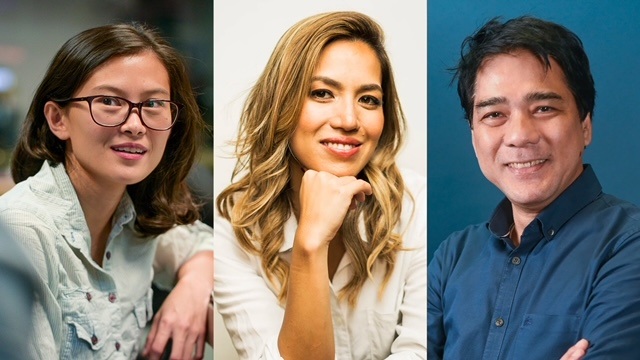
Natashya Gutierrez, Pia Ranada, and Jon Dayao occupy major posts in Rappler
MANILA, Philippines – Rappler’s founders announced on Friday, October 6, the appointment of Natashya Gutierrez as company president. Among the pioneers of Rappler, she was also former editor-in-chief of Vice News Asia-Pacific.
Her new designation ushers in the next generation of leaders in the 11-year-old organization as it strives to shape the future of news.
As Rappler president, Gutierrez, who covered politics and ran Rappler’s Indonesia bureau, will “shape the evolution of Rappler’s pillars of journalism, technology, and community at a time of creative destruction for the global news industry,” said Rappler CEO and Nobel Peace Prize laureate Maria Ressa, who co-founded Rappler with journalists Glenda Gloria, Chay Hofileña, and Beth Frondoso.
“Our succession planning in the last three years is now bearing fruit and we are eager to see how – and where – the next-gen newsroom leaders will take the mission of journalism in the coming years,” Ressa added.
Rappler senior reporter Pia Ranada has also been promoted to Community head to steer the organization through the future. Ranada, who covered Malacañang in the tumultuous years under Rodrigo Duterte, is tasked with evolving Rappler’s journalism to “build communities of action” – a key part of Rappler’s founding mission.
Joining the two women is chief technology officer Jon Dayao, who has more than three decades of experience in building teams, systems, and businesses. Before joining Rappler, Dayao built and operated educational systems as former vice president of the Mapua Malaya Digital College, a digital-first institution focused on business and technology courses.
Founded in July 2011, and its website launched in January 2012, Rappler is one of the few journalist-led media companies in the world and the first in the Philippines to develop multiple revenue streams that include institutional and individual support from its readers and supporters.
“That was partly because repeated attempts to intimidate and harass Rappler brought out the best in our team and rallied our community,” added Ressa. “Our resolve to #HoldTheLine during the worst of times led us to the best of times.”
Gutierrez started her journalism career at Rappler, where she stayed for seven years. “At a time when news outlets and press freedom, especially in Asia, continue to struggle, it is important for me to contribute to the survival of an independent newsroom. I feel strongly about reporting from this region; we cannot ignore Asia, where over half the world’s population lives. I am privileged to be in a position that can help bring our authentic stories and voices to the rest of the world.”
She added, “I’m excited to return, bring back what I’ve learned, and help carve Rappler’s path towards a more global, innovative, and sustainable future.”
Ranada said she’s “never been more excited about journalism” than when she agreed to take on the role of Community lead.
“Having seen first-hand how polarization can erode trust between journalists and the public, I want to play a part in building back those bridges. Being Community lead gives me a chance to experiment with engaged journalism. It’s a way to convince the public we serve that telling stories and sharing stories can improve their lives. I’m honored to be entrusted this role in Rappler, and I hope I do it justice.”
For his part, Dayao said: “I am with courageous people, willfully risking their lives to tell and protect the truth, and I want a piece of that action. Rappler has a massive and transformative purpose, which drew me in, and now motivates me every day. Coming from the IT outsourcing industry, I have been helping companies build their technologies. It’s now time for me to build and operate technologies for the good of our country.”
After obtaining her psychology degree at Yale, Gutierrez returned to Manila to become part of the first dozen employees who set up Rappler in 2011. In 2014, Rappler appointed Gutierrez as chief of its first international bureau in Jakarta.
Under her watch as editor in chief, the Vice Asia-Pacific team won several awards for their reporting on human rights in the region. In March, Gutierrez was named one of the World Economic Forum’s Young Global Leaders for 2023.
As a correspondent, she has done extensive reporting on the Philippines. Her piece on the impact on Duterte’s drug war on women won top prize for reporting on women’s issues at the Society of Publishers in Asia-Pacific Awards, while her collaborative cross-border investigation into the killing of land defenders won a merit for multimedia reporting at the Human Rights Press Awards. She was also part of the Vice News Tonight team that earned an Emmy nomination for Outstanding Recorded News Program, for her coverage of the 2022 Philippine presidential elections
Ranada has just finished her John S. Knight fellowship at Stanford, where she studied disinformation and engaged journalism. She led various special projects at Rappler, such as the coverage of the climate crisis and the plebiscite of the Bangsamoro region. In 2022, she was named one of The Outstanding Women in the Nation’s Service.
Dayao, who holds a doctorate in computer science from the University of Brighton in the UK, has run operations of local and international companies. Former director of the financial global services group Macquarie Philippines and Telus International, Dayao had also served as dean of computer studies at De La Salle University.